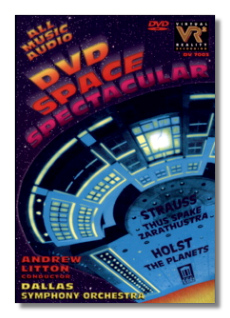
The Internet's Premier Classical Music Source
Related Links
- Latest Reviews
- More Reviews
-
By Composer
-
Collections
DVD & Blu-ray
Books
Concert Reviews
Articles/Interviews
Software
Audio
Search Amazon
Recommended Links
Site News
 DVD Review
DVD Review
DVD Space Spectacular

- Richard Strauss: Thus Spake Zarathustra
- Gustav Holst: The Planets
Dallas Symphony Orchestra/Andrew Litton
Delos DVD DV7003 34:23 + 48:55 Dolby Digital
Here we have two war horses and two spectacularly recorded efforts by Delos's always dependable engineers – and two fine performances. So what more could you ask for? Maybe nothing. But when you see repertory like this tackled for the umpteenth time – and showcased on a gaudy, futuristic-looking cover (will Strauss's tone poem ever be able to divorce itself from Stanley Kubrick's 2001: A Space Odyssey?) – one expects something out of the ordinary. Litton offers performances, however, that are fairly centrist, a bit stiff in places, and not particularly revelatory. Don't take that to mean they're devoid of insight or of any deft interpretive touches. This American maestro imparts color and atmosphere to these scores nearly as well as anyone, and there's hardly a moment's inattention to detail by him or his Dallas players. Everything is tidy, neat and shipshape – remarkable qualities in a recording considering the "live" origins. But you do find yourself wishing for more passion and urgency, more elasticity and personality. Still, you could purchase these recordings and feel reasonably satisfied with them. For one thing, there's a consistency in the interpretive approach and in the spirited playing: Mercury and Jupiter, and some of the lighter moments of Zarathustra, exude a freshness and infectious joy; Mars generates considerable excitement; and never is there the least hint in either score that the orchestra is scrambling to keep up or that the conductor isn't in complete control.
Even among recent releases, however, fans of these scores will find formidable competition in this repertory. The Solti/Berlin Philharmonic Zaruthustra on London (one of that maestro's last recordings) was a stunning effort, a bit slower than his mid-1970's Chicago effort. As for The Planets, the Karajan/Vienna Philharmonic performance from 1961, recently re-released on London, is about as powerful an account of this work as I've ever heard. Mars never sounded so wantonly militaristic and savage as in this Karajan reading. Even the sonics are splendid. In company like this Litton and Dallas don't exactly pale, but neither do they particularly stand out.
I should mention that this Delos production is a DVD- (Digital Versatile Disc) compatible issue. I'm not exactly sure what sonic advantages you gain in this kind of technology, although I do know a DVD CD-ROM disc can hold much more data. In any event, the sound is quite vivid and presents the music in a venue very nearly the same as being in the concert hall for the live performances themselves. This kind of sonic realism, along with the high level of the performances and the two-for-the-price-one offer by Delos, make this set an awfully attractive alternative to its imposing competition.
Copyright © 1998, Robert Cummings




















